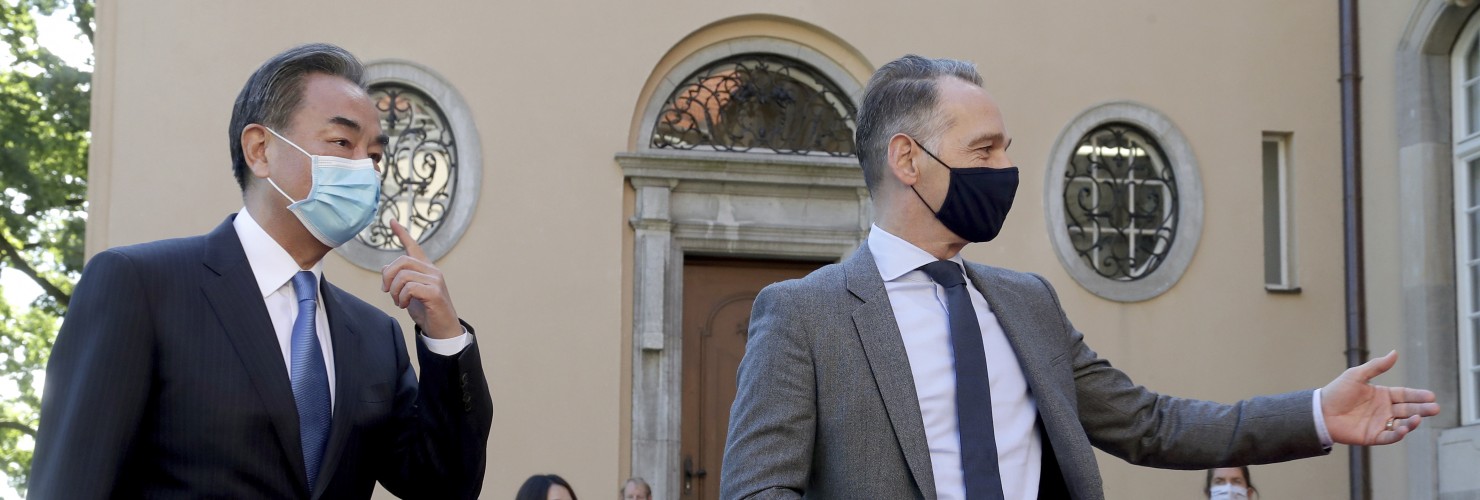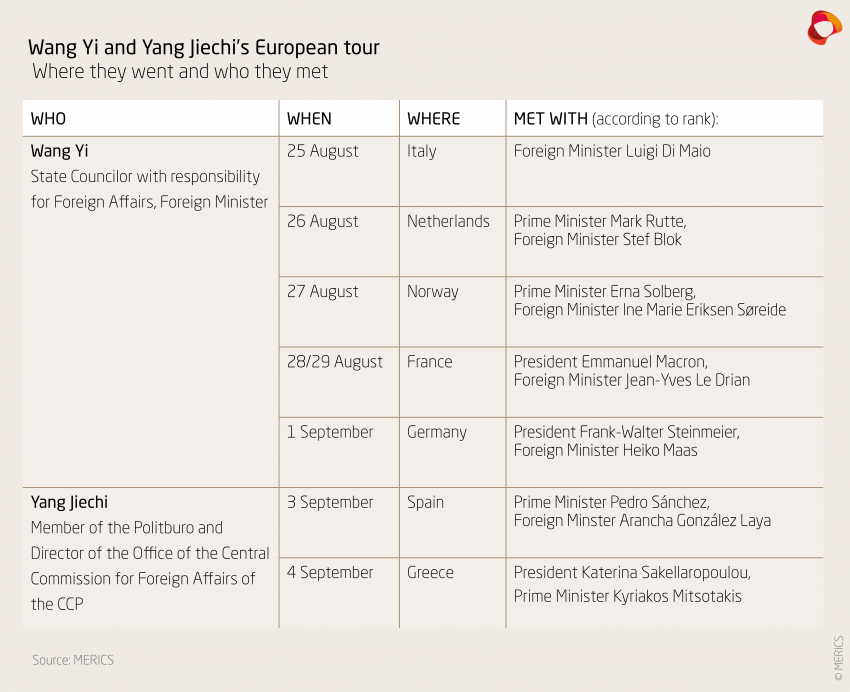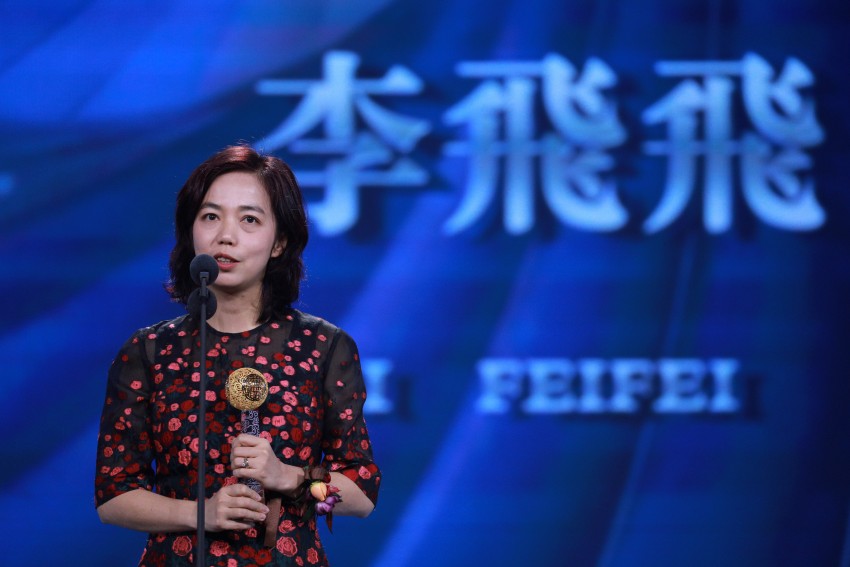

Beijing’s “Year of Europe” launched against headwinds
TOP STORY: Beijing’s “Year of Europe” launched against headwinds
Back in December, Chinese State Councilor and Foreign Minister Wang Yi promised an audience of policymakers in Brussels that Europe would be high on Beijing’s diplomatic agenda for 2020. The conclusion of a Comprehensive Agreement on Investment (CAI) with the EU – under negotiation since 2014 – by the end of this year was its top economic priority.
China’s diplomatic offensive in Europe over the past two weeks – a counter-response to recent visits by White House officials – has confirmed Beijing’s unprecedented attention for the region. Now all eyes are on a video conference scheduled for September 14 between Chinese President Xi Jinping, EU leaders Charles Michel and Ursula von der Leyen, and German Chancellor Angela Merkel, as holder of the rotating presidency of the Council of the EU.
Minister Wang and Chinese Communist Party’s top diplomat and Politburo member Yang Jiechi have just completed a tour of seven European countries, which they hoped would set the stage for next week’s meeting. The reception they received, however, was rougher than expected. Wang’s calls to uphold multilateralism and focus on CAI were met with criticism of Beijing’s human rights violations in Xinjiang and its imposition of a National Security Law (NSL) in Hong Kong. A further bone of contention was the Hong Kong Legislative Council elections, which were originally scheduled for September 6 but have been postponed to next year. Hong Kong police forcefully dispersed protests on Sunday, arresting some 300 people. A video of an officer tackling down a 12-year-old girl went viral.
In Berlin, German foreign minister Heiko Maas got straight to the point and called for China to withdraw the NSL. He also asked for a UN observer mission to Xinjiang. If that was not enough, the German government chose the day of Wang’s visit to Germany to release its Indo-Pacific strategy, formally adopting a concept that was seen until recently as too confrontational towards Beijing.
While Yang’s trip to Greece and Spain was lower key, he also did not hear the exclusively positive words that Chinese officials have been accustomed to in their visits to Europe. In Spain’s official readout of the meeting with Yang there was no failure to mention 5G networks security or Beijing’s behavior in Hong Kong and the South China Sea.
What to watch: Wang and Yang may be feeling bruised by their reception in Europe, but European governments still remain open to cooperation with Beijing both economically and on the Covid-19 pandemic. The trip has made clear, however, that they expect China to deliver concrete results and will not just accept the usual promises of economic opening. Xi Jinping has emphasized the driving role of Chinese SOEs in China’s post-pandemic economic recovery – adding to already-existing obstacles that make the conclusion of a CAI by year end unlikely.
MERICS analysis: “Now the ball is in China’s court. If Beijing wants to avoid alienating Europe any further and prevent the creation of a Transatlantic front on China – the prospects of which would be more likely in the event that Joe Biden wins the US Presidential elections in November – at next Monday’s meeting Xi needs to be ready to walk the talk on investment negotiations,” says MERICS analyst Lucrezia Poggetti.
Media coverage and sources:
- SCMP: China must deliver on opening up promises
- SCMP: Wang sees only limited diplomatic gains from European trip
- SCMP: Viral video of Hong Kong police tackling 12 year old girl
- Deutsche Welle: Maas calls for withdrawal of Hong Kong security law
- German Foreign Office: Indo-Pacific strategy
- Spanish Foreign Office: Official report of meeting with Yang
Overseas demand helps China’s economic recovery – but can it last?
The facts: China’s economic recovery is being driven by strong overseas demand. According to the latest release of trade data, China is running a trade surplus of 58.9 billion USD. More than half of that surplus is with the United States – in spite of all the talk of “decoupling”. Indeed, at 34.2 billion USD China’s trade surplus with the United States is currently its second largest in history.
While exports are strong, retail sales have not yet recovered. Overall, so far this year China’s recovery has been sluggish with no month recording positive growth. Data released on September 7 show exports rose in August by 9.5 percent (down by 2.3 percent on the year to date), while imports fell 2.1 percent (down 5.2 percent on the year to date). Official reserves increased by 9 billion to 3,307 billion USD.
MERICS analysis: To avoid any economic fallout from the pandemic at home, Beijing is maintaining high production levels. With dampened domestic demand, that means any surplus is shipped abroad. Meanwhile, China’s imports of US goods have fallen. At this rate, it does not look likely that China can meet the demands in the phase one trade deal with the United States, under which it agreed to increase purchases of American products and services by at least 200 billion USD over the next two years.
What to watch: Poor import and retail performance indicate that internal demand is still weak in China. With Beijing using investment and exports to ensure employment increases, the rest of the world will have to absorb China’s surplus. However, this may not be tenable for long as demand is not strong elsewhere and other governments may be tempted to help their domestic industries instead, through trade action to support employment.
Media coverage and sources:
- SCMP: China’s export machine keeps humming
- Reuters: US-China Phase 1 trade deal
Protests against increased Sinicization of school lessons in Inner Mongolia
The facts: Thousands of school children and parents in cities in the northern Chinese autonomous region of Inner Mongolia are protesting against a change to school textbooks that took effect on September 1. As in the autonomous regions of Tibet and Xinjiang, first graders in primary and middle schools will no longer be taught subjects like history, politics and “ethics and the rule by law” from textbooks written in Mongolian, but in Chinese. Following demonstrations and school boycotts in several cities and districts, the police have arrested at least 23 people. Party and administrative authorities have dismissed several Mongolian officials and civil servants who refused to end the children’s school boycott and have initiated disciplinary proceedings against them. The Chinese government has justified the step as a gradual expansion of bilingual schooling to give ethnic minorities more opportunities as well as "improving the recognition of the Chinese nation", as the Global Times put it.
What to watch: The Chinese government is intent on pushing through its strategy of forced assimilation of all ethnic minorities – if necessary, with even more violence. Just as in Tibet and Xinjiang, Beijing is likely to deploy further surveillance measures and repression to break any resistance.
MERICS analysis: “This seemingly minor change in the curriculum is a central plank of Beijing's policy of imposing a Communist-defined Chinese identity on all sections of the population,” says MERICS expert Kristin Shi-Kupfer. “Furthermore, Inner Mongolia, like Tibet and Xinjiang, has an important geopolitical significance as a border region and as a source of raw materials.”
Media coverage and sources:
- Global Times: Disinformation causes “twists” in bilingual education in Inner Mongolia
- Inner Mongolia Autonomous Region government website: Guidelines on the use of state textbooks for language teaching in primary and middle schools in the region
- The Guardian: Inner Mongolia protests at China’s plans to bring in Mandarin-only lessons
- Time: China detains 23 in crackdown on Inner Mongolia protests
- Southern Mongolian Human Rights Information Center: Reports on the current protests
- Radio Free Asia: Report on protests
METRIX
SinoChem chairman Ning Gaoning announced last Wednesday that China’s two largest chemical manufacturers, Sinochem and ChemChina, would move ahead with a long-awaited merger. The two chemical giants had a combined revenue last year of about 146.6 billion USD.
(Source: yicaiglobal.com)
VIS-À-VIS
Reinhard Bütikofer: "We are learning to avoid being enchanted by ‘win-win’ rhetoric.”
MERICS China Briefing spoke with Reinhard Bütikofer, member of the European Parliament, member of the Greens/European Free Alliance Parliamentary Group, chairman of the Delegation for Relations with the People's Republic of China (D-CN), member of the Committee on Foreign Affairs (AFET).
Berlin wants to repoint China relations. What will Monday’s high-level video conference with the EU and Chinese leadership bring?
The German government wanted to steer developments and now finds it’s been overtaken by them in some areas. The softly-softly approach that used to be quite popular in Berlin will not do anymore. I’m pleased that German Foreign Minister Heiko Maas has discovered a new tone – for example, when Chinese Foreign Minister Wang Yi visited Berlin, he stood in solidarity with the Czech Republic after Wang denounced the Czech Senate President’s visit with his delegation to Taiwan.
The question remains whether Beijing heeds our words if the overwhelming impression in the Chinese capital is that there is nothing to fear beyond verbal criticism. A strong signal of being willing to go further, for example, would come if Germany uses its EU Council Presidency to finalize an EU sanctions mechanism against human rights violations. For the video-conference with Xi Jinping next Monday, the investment agreement is high on the agenda. European Commission President Ursula von der Leyen and EU Council President Charles Michel have to make sure the EU resolutely sticks to its demands. They cannot allow German Chancellor Angela Merkel to push them into weakening our European position. That is my measure of success.
What does Europe have to watch in talks on the European-Chinese investment agreement?
I’m critical of the negotiations at this point. Our ideas are focused on better market access, including in telecommunications, fair competition with China's state-owned companies, and a robust section about sustainability. There have been no breakthroughs on any of these three fronts. But the enforceability of agreements is the real crux. That means we cannot be satisfied with mere paper promises.
Wang Yi’s European tour failed as charm offensive. Is Europe finding a unified critical stance?
I don't know whether Wang Yi really intended to go on a charm offensive. I got the impression that his visit was meant to teach various capitals that Chinese bluster, pressure and threats are becoming the norm – bullying as the new normal. Given that, we Europeans have really not yet sufficiently closed ranks. But even in the future Europe will not have a totally unified China policy – different national interests won’t just disappear into thin air. But EU members are now working together much more closely in some areas than just a few years ago, jointly fighting Chinese price dumping and unfair subsidies, demanding reciprocity in public tenders, showing their concern for the security implications of sensitive investments. We are learning to avoid being enchanted by ‘win-win’ rhetoric and to make sure that the cooperative relationship we’re seeking will not weaken us in the systemic rivalry with the People's Republic. There is still too much wishful thinking on our side. Take climate protection, for example. I often hear that China is an indispensable partner – indispensable, yes, but partner, no. In Beijing, climate policy is at best moving sideways. We can only make progress by speaking plainly.
Does the EU need a new China policy? What can Germany do to promote more unanimity?
In spring 2019, the EU rightly adopted a more careful attitude to the People's Republic. So there is no need to reinvent the policy. But implementation is proving tough because it is so fragmented. As the country with the closest relations with China, Germany could play on an extremely helpful role in this regard. But Berlin would first have to pay more attention to subsuming German China policy to a European one. To put it bluntly, as long as we have to worry that the Chancellery equates German and European interests with those of the overly China-dependent German car industry, European unity vis-à-vis China will always be fragile. There is an old US saying that what is good for General Motors is good for the USA. That was never true and would today be an extremely old-fashioned course to take. But Wolfsburg would still very much like to see everyone dancing to such a tune.
Would it be useful to hold a full-blown EU-China summit this year rather than next?
I think it's unlikely that the summit will be brought forward. Why should we eye a summit if there is no common substance? Let’s lay the eggs first and then cluck over them, not the other way around.
The interview was conducted by Kerstin Lohse-Friedrich, Director Communications, MERICS
Image of Reinhard Bütikofer: Copyright European Parliament
REVIEW
Trade Wars are Class Wars by Matthew Klein and Michael Pettis (Yale University Press, 2020)
Matthew Klein and Michael Pettis have successfully woven a grand narrative linking income inequality, geopolitics, trade, finance and even environmental issues. Their discussion of how capital moves across borders and transmits distortions in one economy to another is set against the backdrop of the United States’ increasing conflicts with its largest trade partners, the EU (particularly Germany) and China.
It boils down to this. In a world which does not control capital flows, a change in one country’s financial conditions will ultimately result in a change in another’s. This in turn creates economic effects on employment, investment, and trade.
In the case of China, Klein and Pettis argue that it has constrained domestic consumption leading to a rise in savings. Not all of these savings can be absorbed domestically, so outbound investment has increased. Countries with open capital markets such as the US and the UK have absorbed the investment, causing their imports to grow. This creates a wealth transfer within those countries as financial markets benefit from the inflow, whereas industries which traditionally provide working class jobs are given more competition from foreign products
The book is great reading for anyone wanting to understand global tensions. At times, however, the authors use their framework to analyze problems for which it is not entirely fit. For example, they claim the Belt and Road Initiative is best understood as China creating foreign markets to absorb its surpluses. While I do not disagree with this claim itself, I do not think it is the best or only explanation.
Maximilian Kärnfelt, analyst, China’s macroeconomy, monetary policy and financial markets
PROFILE: Li Fei-Fei
Li Fei-Fei – Twitter board member and Professor of AI at Stanford and Tsinghua
Chinese-born American computer scientist Li Fei-Fei has made headlines again with her recent appointment to the board of directors at Twitter.
Li is well known as a leading academic in the field of AI. She is a professor at Stanford University in the United States and an adviser on AI to China’s Tsinghua University. During a sabbatical from Stanford from 2017 to 2018 she served as Chief Scientist of AI and machine learning at Google Cloud.
Born in Beijing in 1976, she moved to the United States at the age of 12. After school, she studied physics at Princeton University and went on to gain a PhD in electrical engineering from California Institute of Technology.
She is considered to have made a significant contribution the area of deep learning, but her appointment to the Twitter board has attracted criticism with some saying it raises a potential conflict of interest. Li’s role as an independent director means she could be involved in high-level decisions about labelling propaganda and state media accounts. However, Li is claimed to have ties to a student association that is affiliated with the CCP’s United Front and in 2017 she was recipient of the CCP’s Top Ten Female Figures award.
Allegations have been made that the Twitter accounts of a number of Chinese dissidents have been deleted from the social media site since Li joined the board of directors. A petition was created on the White House website calling for a “thorough investigation on Twitter’s violation of freedom of speech”.
Media coverage and sources:
- Radio Free Asia: Twitter’s hiring of China-linked AI expert sparks concern
- Taiwan News: Petition against Li Fei-Fei’s role at Twitter
MERICS China Digest
MERICS’ Top 3
- RFA Chinese: Xi Jinping calls for food security, people fear return of rationing (in Chinese)
- SCMP: Carrie Lam sides with HK education chief on no ‘separation of powers’ in city
- WSJ: China launches initiative to set global data-security rules to counter foreign doubts
International relations
- BBC: First shots in 45 years allegedly fired along Sino-Indian border amid deteriorating relations
- US Department of Defense: Release of annual assessment of PLA strength
- Euronews: Czech Senate President prompts condemnation from Beijing in rare Taiwan visit
- Reuters: Laos cedes majority control of its power grid to Chinese company
Politics, society and media
- SCMP: Pompeo wants to see China’s Confucius Institutes gone from US by end of year
- Asia News: Despite the lack of jobs, Chinese migrants do not want to leave the cities
- The Paper: Sinopec to hire 1.1 million graduates despite making losses (in Chinese)
- NYT: US Tik Tok chief executive Kevin Mayer resigns
- SCMP: Taiwan exports surge to record immediately before total US export ban on Huawei
- The Diplomat: Who Is the Real Mulan? Fights over the popular Disney character
- The Guardian: Two Australian journalists flee China after tense diplomatic standoff
Economics, finance and technology
- SCMP: Bottled water giant Nongfu experiences extremely successful stock market debut
- Reuters: Xi supports set-up of pilot international free trade zone in Beijing
- Financial Times: US and Taiwan to work on reshaping supply chains away from China
- Bloomberg: China to plan support for domestic semiconductor industry to counter Trump


